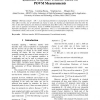14 search results - page 1 / 3 » On the (Im)possibility of Basing Oblivious Transfer and Bit ... |
EUROCRYPT
1999
Springer
13 years 9 months ago
1999
Springer
We consider the problem of basing Oblivious Transfer (OT) and Bit Commitment (BC), with information theoretic security, on seemingly weaker primitives. We introduce a general model...
CRYPTO
1995
Springer
13 years 8 months ago
1995
Springer
Abstract. In this paper we present an eficient protocol for “Committed Oblivious Transfer” to perform oblivious transfer on committed bits: suppose Alice is committed to bits 0...
TCC
2004
Springer
13 years 10 months ago
2004
Springer
Quantum 2-party cryptography differs from its classical counterpart in at least one important way: Given blak-box access to a perfect commitment scheme there exists a secure 1−2...
FCS
2006
13 years 6 months ago
2006
- Oblivious transfer OT is an important primitive in cryptography. In chosen one-out-of-two OT, Alice offers two bits, one of which Bob can choose to read, not learning any informa...
EUROCRYPT
2007
Springer
13 years 9 months ago
2007
Springer
We show an efficient secure two-party protocol, based on Yao's construction, which provides security against malicious adversaries. Yao's original protocol is only secur...


